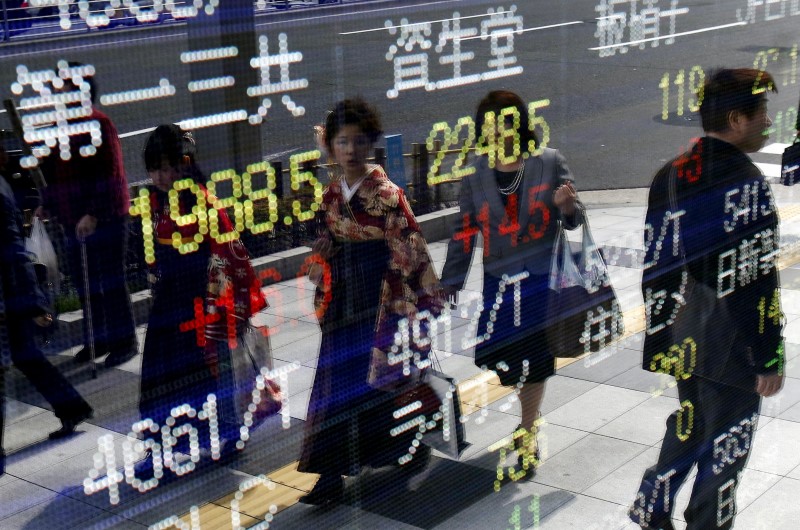By Shinichi Saoshiro
TOKYO (Reuters) - Asian stocks were mixed on Friday and the dollar rebounded as rising tensions in the Middle East clouded the investment outlook.
Spreadbetters expected Britain's FTSE (FTSE), Germany's DAX (GDAXI) and France's CAC (FCHI) to tip toe higher while the markets awaited fresh cues from the Middle East.
Crude oil prices were lower due to the dollar's bounce and as investors reassessed the potential impact of the escalating conflict in Yemen, where Saudi Arabia and allies carried out air strikes on Iranian-backed Houthi rebels on Thursday.
The euro was flat at $1.0883
The dollar was flat at 119.22 yen
Excluding the effect of last year's sales tax increase, data released on Friday showed Japan's core consumer price index was flat in February compared with a year ago. It was the first time it has not risen in nearly two years, and will be disappointing for a government that is seeking to end a long phase of deflation. The yen showed little reaction.
U.S. crude
The Saudi-led operation has not affected the oil facilities of major Gulf producers.
But fears the conflict could spread and disrupt Middle East shipments have propped up sagging oil prices.
The air strikes in Yemen and a potential nuclear deal with Iran that could lead to a loosening of sanctions against Tehran would have little near-term impact on oil supplies, Goldman Sachs (N:GS) said.
Among the region's equities, indexes in Hong Kong, South Korea, Malaysia and Thailand suffered light losses.
Japan's Nikkei (N225) handed back earlier gains and slid 1.3 percent. "Hedge funds and commodity trading advisors are seen taking profits and unwinding their options positions before the first quarter ends," said a senior trader at a foreign brokerage in Tokyo.
Asia's gainers included Australian, Chinese and Indonesian shares.
MSCI's broadest index of Asia-Pacific shares outside Japan (MIAPJ0000PUS) fell 0.1 percent after sliding 1 percent the previous day.
"The conflict in Yemen saw equities on the back foot in Asia yesterday and, should this escalate into a deeper regional conflict, then the risk-off trade is only likely to ramp up," Stan Shamu, a market strategist at IG in Melbourne, said in a note to clients.
Stock markets slumped worldwide on Thursday because of the news from Yemen. Germany's DAX (GDAXI), which hit a record high early last week, shed 1 percent.
Wall Street also closed lower but key indexes there trimmed much of their earlier losses thanks to robust U.S. data.
While keeping a close eye on developments in the Arabian Peninsula, the markets are also waiting for a speech by Federal Reserve Chair Janet Yellen later in the session.

Yellen is scheduled to speak on monetary policy and her comments will be closely analysed after the Fed's dovish outlook last week bruised the dollar.